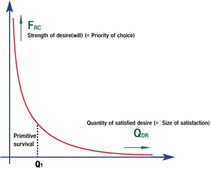|
Chapter 1. Basic Principles
of Political Phenomena
A. General Principles of Political
Phenomena
(3) Basic Theory of Mathematical
Politics
c. Desire Quantity and Will to Struggle
 Generally,
people's desires are short-term stable. In this case,
what is stable is the total quantity of desire. People
want a certain amount of food and drink, a certain
level of safety, and a certain level of entertainment.
They want a certain level of freedom and comfort. Generally,
people's desires are short-term stable. In this case,
what is stable is the total quantity of desire. People
want a certain amount of food and drink, a certain
level of safety, and a certain level of entertainment.
They want a certain level of freedom and comfort.
The desire for fulfillment decreases if the desire
has already been fulfilled in large quantities, due
to the consistency of desire quantity. On the other
hand, if the desire has only been fulfilled a little,
the desire to fulfill it further remains very strong.
Therefore, it can be concluded as follows:
| |
[Ch.1.7] (Consistency
of Desire Quantity) People's desire becomes stronger
when it is less fulfilled; and weaker when it
is more fulfilled. |
Most people have a certain level of
desire, and when food is scarce they strongly desire
food, but once they have eaten enough, they desire
it less. So when their stomach is full, food is no
longer used to satisfy hunger but for other purposes,
such as a tool for sensory stimulation. Similarly,
most people desire freedom, but once they have obtained
a certain level of freedom, they tend to just follow
the choices of others and desire to be restrained
enough.
The consistency of the desire amount
refers to the same thing as the law of diminishing
marginal utility that is mentioned in economics. This
is because the will to satisfy a certain amount of
desire weakens as the desire weakens, meaning that
the utility decreases. However, the fundamental assumption
is somewhat different and the mathematical models
that follow it are also different.
If the amount of desire satisfaction
( )
and the intensity of desire ( )
and the intensity of desire ( )
can be properly quantified, the relationship between
the two can be expressed in the following equation.
(In the context, they will be represented as 'Qdr'
and 'Frc', respectively). )
can be properly quantified, the relationship between
the two can be expressed in the following equation.
(In the context, they will be represented as 'Qdr'
and 'Frc', respectively).
| |
[Fmla.1.8] |
|
( is a constant) |
This equation expresses the consistency
of desire quantity[Ch.1.7]. It means that humans do
not want something A infinitely, but that when they
do want A, despite their strong desire, they are not
able to act as strongly. For example, many people
always want more money, so they earn money and still
have an insatiable desire for money, but they do not
work as desperately as they did when they were poor.
This equation can be simply transformed
into an inverse proportion equation.
| |
[Fmla.1.9] |

or  |
Its representation by graph is as
follows [Diag.1.A].

[Diag.1.A]
Strength change of desire (will to struggle) according
to the quantity of satisfaction (survival condition)
On the other hand, the unsatisfaction
of desire, i.e. the less quantity of desire satisfaction,
implies that the survival condition is bad, and the
high degree of desire strength implies that the person
has a strong will to struggle. Therefore, the consistency
of desire quantity generates the following phenomena:
| |
[Ch.1.8] The worse
the survival condition becomes, the stronger the
will to struggle becomes. Conversely, the better
the survival condition becomes, the weaker the
will to struggle becomes. |
An example from early 19th century
Russia in the reign of Alexander I, when the construction
of military settlements (voennye poseleniia) was attempted
but abandoned due to harsh survival conditions, demonstrates
that harsh survival conditions lead to strong survival
instincts. The military settlements were unbearable
due to oppressive policies, even down to the most
detailed aspects of the regulation, including the
most brutal repression. The harsh living conditions
ultimately led to a strong backlash, which was a survival
struggle. The Consistency of Desire Quantity played
a role in the causal relationship between World War
I and World War II. After World War I, the harsh,
retaliatory nature of the war reparations imposed
on defeated Germany at the Paris Peace Conference
severely damaged the German economy and made living
conditions extremely harsh, leading economists like
Keynes to predict another war. Ultimately, this led
to the outbreak of World War II.
<Every footnote was
deleted from the book>
  
|